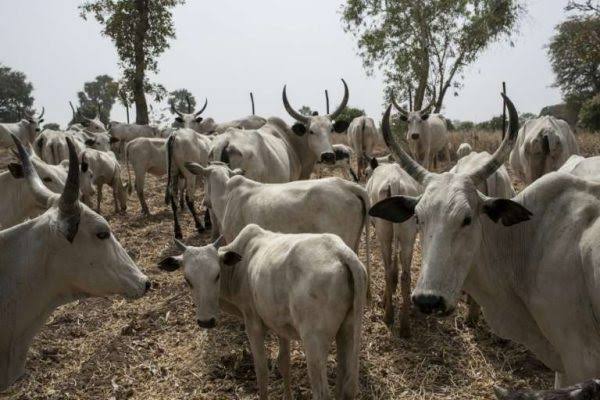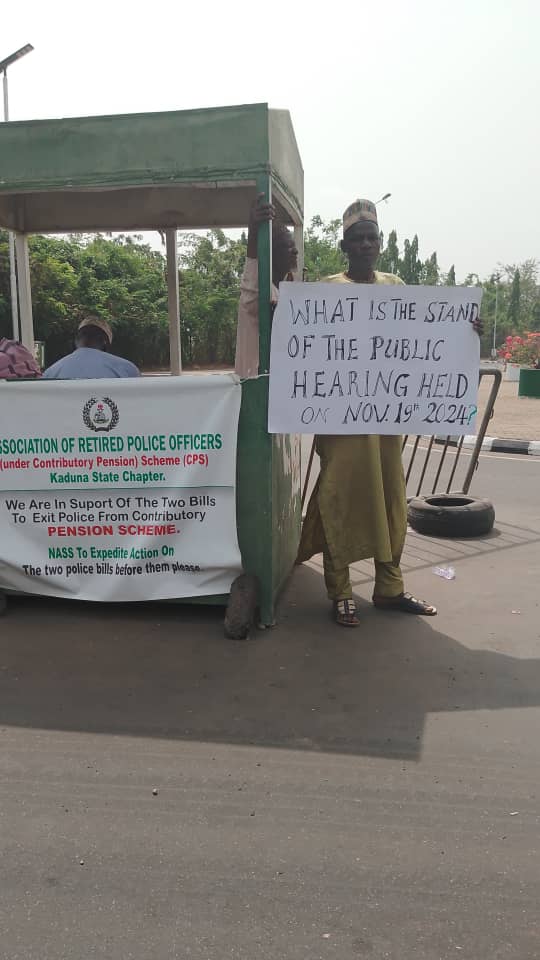News
Agric Ministry caution Nigerians over outbreak of poison in trade animals

By Francesca Hangeior
The Federal Ministry of Agriculture and Food Security has alerted Nigerians over the outbreak of poison in trade animals at Mandate Cattle Market, located near College of Arabic and Islamic Legal Studies at Adewole, Ilorin, Kwara State.
In a statement, the Permanent Secretary, Federal Ministry of Agriculture and Food Security, Temitope Fashedemi, noted that the government is making efforts to trace and confiscate the meat from the slaughtered animal and were subsequently disposed in an environmentally friendly manner.
According to the statement, 40 suspected poisoned animals were treated with organophosphate antidotes, and they responded with marked improvement in their health, leading to recovery.
The statement reads in part: “The Federal Ministry of Agriculture and Food Security hereby alerts the General Public on the outbreak of poison in trade animals which occurred at Mandate Cattle Market, located near College of Arabic and Islamic Legal Studies at Adewole, Ilorin, Kwara State.
“According to the report from Kwara State Ministry of Agriculture and Rural Development, mortality in herd occurred at this market on Saturday, 20th April, 2024 and the outcome of the investigation revealed that animals had grazed on the forage that was fumigated with organophosphate chemical prior to the incident.
“The report further stated that clinical signs observed were hypersalivation, weakness, and recumbency. On noticing this, the herders decided to slaughter 7 of the very weakly affected animals for public consumption.
“This has public health risks, and the consequences may be very severe in the food chain.
“It is important to note however, that there is a Rapid Response Team (RRT) in every state of the Federation, made up of Federal Epidemiology Officer, State Director, Veterinary Services and State Epidemiology Officer, who have been adequately trained by the Federal Ministry of Agriculture and Food Security for emergency situations such as this.
“In this particular instance, the RRT in Kwara State in collaboration with the State Government’s task force, swiftly swung into action to trace and confiscate the meat from the slaughtered animal; these were subsequently disposed of in an environmentally friendly manner.
“The report added that 40 suspected poisoned animals were treated with organophosphate antidotes, and they responded with marked improvement in their health, leading to recovery.
“Other actions taken included the following: Cleaning and disinfection of the abattoir that the carcasses were dressed; Creation of public awareness on the danger of consuming the meat from affected slaughter animals was issued; Collection of blood and tissue samples for laboratory testing and analysis.
“To avert the future occurrence of this bad and hazardous agricultural practice, the Ministry wishes to inform the General Public that: There is danger in consuming unwholesome meat and other food of animal origin, especially contaminated with organophosphate.
“Meat for human consumption should be purchased at registered, government/private approved spots such as abattoirs, slaughter slabs, meat shops, etc. Such products must have been certified wholesome, fit for consumption by a registered veterinarian.
“Meat from dead animals is unwholesome and should not be consumed; With a withdrawal period of 14 -21 days after injection, ingestion and / or application of drugs or chemicals preparation on animals should be strictly observed before products from such animals are certified for consumption.
“Dead animals should be properly disposed of with the aid of veterinarians and environmental health officers; Report and diseased animals or suspected to be diseased to the nearest veterinary clinics/hospital or animal health services providers; People who may have genuine reason to apply chemicals on open farmlands or fields should please notify their host communities to avoid grazing animals on such fields for at least one week.”
However, the Ministry assured Nigerians that it will through its Department of Veterinary and Pest Control Services continue to work with States’ Veterinary Services in synergy to ensure that best veterinary and agricultural practices are observed, especially, for disease, agricultural pests and hazard prevention and control, with the professional motive of enhancing animal welfare and ensuring availability of wholesome food of animal origin.
News
Reps Direct FCT Minister to Appoint Auditor-General for FCT Area Councils

By Gloria Ikibah
The House of Representatives has urged the Minister of the Federal Capital Territory (FCT), Nyesom Wike, to appoint a substantive Auditor-General for the Area Councils without delay, in accordance with legal provisions.
This decision was sequel to a resolution adopted during the Public Accounts Committee (PAC) hearing on Wednesday, 26th February 2025, in Abuja.
The committee noted that the absence of a substantive Auditor-General had hindered the signing and submission of audited financial reports, a process mandated by the constitution.
During the session, the Acting Auditor-General for the Area Councils, Abdullahi Ibn Salihu, made a presentation, and in response, the committee chairman, Rep. Bamidele Salam, emphasised the urgency of the matter, leading to the adoption of a motion for immediate action.
He said: “Honourable colleagues, I think we should also step into this. Like I said, when we resumed in October 2023, the Office of the Auditor-General for the Federation in Nigeria was vacant for about 2 years. The former President, President Muhammadu Buhari refused to make an appointment. And so, audit reports were not submitted. So, when we came in, myself and the Senate counterpart decided to write letters to the President and make some advocacy upon which a substantive was appointed.
“If they have the same case, I think we will also need to step in so that we can call on the Minister. We may need to write to him and invite him. Maybe he has reasons why that appointment has not been made. I think we should. We should actually have a resolution on this also”.
Earlier, during a review of the financial reports of FCT Area Councils, Acting Auditor-General, Abdullahi Ibn Salihu, clarified that most of the financial discrepancies flagged by the committee occurred under previous administrations, as he has only been in office for six months.
Key concerns raised included the failure to submit audited financial reports for 2023-2024, non-remittance of pension deductions to the Pension Commission (PENCOM), and the withholding of available audit reports from the committee.
Rep. Billy Osawaru stressed the need for strict enforcement of legal provisions against the Auditor-General’s office, insisting that such lapses must not persist.
To ensure a thorough review, a five-member sub-committee, led by Rep. Tochukwu Okere, was established to investigate and provide recommendations. Other members include Rep. Ajiya Abdulrahman, Rep. Mandara Usman, Rep. Mauruff Adebayo, and Rep. Mohammed Bargaja.
In attendance were Abuja Municipal Area Council (AMAC) Chairman, Hon. Christopher Zakka Maikalangu, and Bwari Chairman, Hon. John Gabaya, while Kuje and Kwali were represented by their vice chairmen.
News
Day 3: Retired Nigerian police officers continue protest on Police Bills(Photos)

By Emmanuel Agaji
Association of Retired Police Officers, Kaduna chapter protest on Police Bills entered day three today, February 27, 2025, Thursday at the National Assembly.
Naijablitznews reports that some of the placards being displayed by the retired simply indicate that the output and input of November 19th, 2024 public hearing on the Bills should be implemented.
They equally supported the fact that the police force should exit the contributory scheme.
The very aged retired officers could be seen sighted sitting under the son bearing placards which they display for motorists to look at.
See photos:
News
Just in: Police restore Obasa’s security details, withdraw Meranda’s as ex-Lagos speaker set for return

By Kayode Sanni-Arewa
Mudashiru Ajayi Obasa who was impeached as speaker of the Lagos House of Assembly on January 13, 2025, is set to return.
Daily Trust understands that his security details have been restored just as those of Hon. Mojisola Lasbat Meranda, have been withdrawn.
Meranda was Obasa’s deputy before the impeachment. After his removal, the house unanimously elected Meranda, making her the first female to occupy the position in the history of the state.
Though she’s yet to officially resign as the Speaker of the House, her fate was reportedly sealed over the weekend by key All Progressives Congress (APC) leaders who intervened in the crisis rocking the House of Assembly.
Former National Chairman of APC, Chief Bisi Akande, former Governor of Osun State, Chief Olusegun Osoba, former Commissioner for Justice, Dr. Muiz Banire and members of the Governance Advisory Council (GAC) and some of the lawmakers had met over the weekend to find a resolution to the crisis.
It was at the meeting that the fate of Meranda was sealed as she was reportedly asked to vacate her seat.
There are indications that Obasa might return as the Speaker as following the resolutions reached by the leaders which largely favoured Obasa’s return.
“In truth, what they said was that Obasa’s removal was illegal and the lawmakers were directed at the meeting to go and return him,” sources familiar with the matter had said.
It was not clear yet when the House would reconvene to effect the expected changes.
Meranda had adjourned plenary indefinitely two weeks ago when there was commotion in the assembly as a result of invasion by operatives of the Department of State Services (DSS).
-

 News23 hours ago
News23 hours agoSenate committee on health invites stakeholders to a one-day public hearing on 3 major Bills
-

 News16 hours ago
News16 hours agoThey’re after my life i – NAFDAC DG raises alarm
-

 News20 hours ago
News20 hours agoEmefiele: Judge turns down request to withdraw from trial
-

 News16 hours ago
News16 hours agoNaira again falls against Dollar – February 26
-

 News16 hours ago
News16 hours agoPolice Halt Attempt To Invade Kano Emir’s Palace, Nab 17 Suspects
-

 News16 hours ago
News16 hours agoSAD! Billionaire Folorunso Alakija Reportedly Goes Blind
-

 Metro10 hours ago
Metro10 hours agoBoko Haram reportedly raze villages in Adamawa communities, loot property
-

 News20 hours ago
News20 hours agoBenue boils again as gunmen abduct 4 female varsity students










